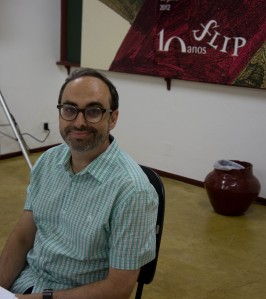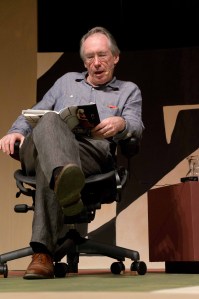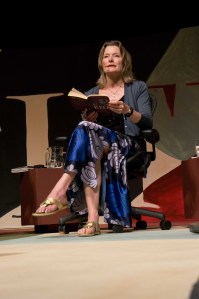Paraty, Day 4
The day started with a press conference with Ian McEwan. He was his gentle mediative self and shared his love of Brazil. He first came to Brazil with his son in 2004 and his son said at the time Paraty had been the best 15 hours in Ian`s diary. His son, Gregory met a girl and hás since learned Portuguêse. Father and son both love the sound of the Portuguese language, calling it “a rich wine sound. Paraty has a charm that the festival enhances its not like Hay. There are more people but the place is not overtaken and changed”. When asked what he would want from a Paraty in 2013 he said “do not change a thing”. “Maybe a good phone service or a yacht that could bring all the writers at one time rather than by road”. I can agree with him there, the roads to Paraty are not always great and there are many speed humps that could break an axle.
He said the novel is an instinctive and elaborate device to help us understand the human condition. It’s a set on conventions that unravels the human condition. Talking about his character Briony from Atonement, a character set in the end of the 20th century, he said I do not think the past can be repaired, but we can reflect on it. Briony wrote 8 drafts trying to address the truth. He said “history is something that should be emphasised in schools as nations tend to have a collective forgetting, We are guilty of a terrible act of forgetting. It’s a mass folly”.
When asked about the theatre he confessed that he gets irritated, “theatre does not let me suspend reality. I do not enjoy English audiences, someone only has not swear and people laugh. In the novel standards are higher”.
He said he was currently in the “numb state of a finished novel”. “I feel like a sponge, it’s a passive state. I am reading”
When asked about Jennifer Egan he said he loved her work and in particular Tweets from Block Box about a Spy which can be found for free in the New Yorker. He said they had not prepared anything for the session they would be doing together, but like press conferences he would let things just flow.
After the press conference Ian went into a round table session with Jennifer Egan. The session was called “Through the eyes of the other”. They both talked about the importance of imagination as a humanising factor. Ian read from his new novel Sweet Tooth (released in Brazil before the UK it comes out in August) which is about a secret agent. He said he had had lunch with Le Carre to get an understanding of MI5. Jennifer read from her book The Keep which is about Danny a man who reflects on his actions as a child. She also talked about Black Box a set of tweets picked up by the New Yorker.
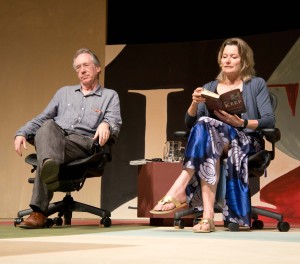
Later in the day AnnaLena McAfee talked about her book The Spoiler She worked for 16 years for the Financial Times and three years ago left as Editor of the Guardian Literary Supplement. Her book is set in 1997 at a time when many were saying the internet is a passing fad, just like Eseranto and ham radio. Her character is a young journalist who is unprepared for this change. She said her colleagues at the Guardian were fighting to identify themselves in the book. She said looking back “I invented the Leveson inquiry”. She commented on the nature of journalism and contrasted it with novel writing. She does not think regulation is the answer for some of the media’s excesses in the UK, but a self regulation that journalists should abide. She said perhaps everyone in the room wanted to be a writer and the panel she was with, reflected on whether novel writing was a step up from journalism or just a different form of writing. Paulo Werneck, who shared the platform with her, argued that not all journalists want to be writers of novels. They are separate processes and the excitement of a newsroom during particular high profile events cannot be match. They agreed that if you can write in a newsroom you can write anwhere. She was asked what advice she would give to a young editor of a literary magazine and she said “Do not patronise your readers, talk up to them and not down to them”. “Newspapers no longer rely on getting news, but often rely on speculation and what is needed is quality reportage, such as the Guardian’s investigative work, but this is expensive. Advertisers have cut back and moved to the Internet. The futre of print may be in a boutique product, like artisan cheese, a luxury good. News will be mostly online”.
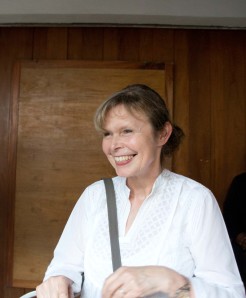
AnnaLena was asked what were some of the highs of being an journalist and an editor of the Guardian Literary Supplement. She said she had interviewed Arthur Miller for 4 hours and also an interview with Doris Lessing and covering the Falklands war had been high points. “The job is one of privileged access”. She said it was exciting to find new talent, to be the first to find fabulous writing and she recommended two women poets. One in particular Dorothy Molloy, was discovered but had died one month before McAfee read her work. The other writer Alice Oswald translated the Iliad. “These are rare moments” she said.
Gary Shteyngart also held a press conference on day 4. He is an American satirist of Russian heritage. He arrived in America aged 7 with parents who had been swapped by Brezhnev and Carter in 1979. Russia needed grain and in return America received 150,000 Russian Jews. “Americans do not read – 300 pages is too much” he explained and that is why he had created a book trailer with a couple of actor friends – a trailer movie about the book. He is currently working “on his memoir as Jewish men die about 57” and he turned 40 on July 5 during Paraty. He wants Isabella Rossini to play he mother. “”I can dress up like a baby and she can rock me” he said.
Satire was much easier under Bush we really need another Bush – grandson of Bush because its fun when satire and stupidity clash.
